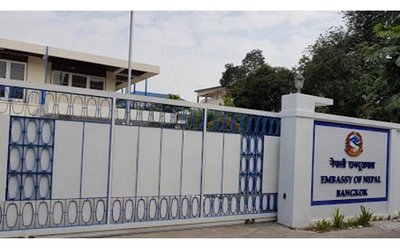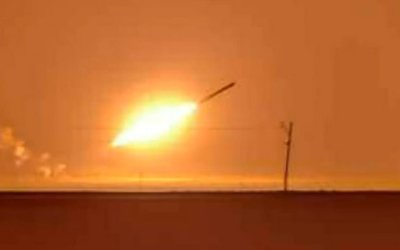Climate change challenges are scaling-up along with temperature rise and change in precipitation pattern. In the last week of July this year, people in eastern Terai cut paddy seedlings for cattle as they could not plant in the paddy field due to lack of or inadequate rainfall. Nepal's agriculture is mostly rainfed and irrigation canal in the lowland are rather filled with sediment than water due to high rate of land degradation in the upstream. This impact on paddy cultivation might repeatedly occur due to evidence-based weather modification and change in climate system. Nepal has experienced and realised the problem of 'too much water and too little water' and shifting of rainfall dates in the recent years. It might result to climate-induced disasters as precipitation, in the previous years, indicates no remarkable change in total precipitation but number of rainy days having more than 100ml of rainfall has decreased. It indicates for heavy rainfall in shorter time resulting to devastating flood, riverbank cutting, and loss of lives and property.
In order to address the on-going effects and emerging challenges of climate change, Nepal has prepared and started implementation of NAPA, LAPA and climate change policy. Nepal has also introduced climate change budget code to streamline and channel climate finance and track public expenditure annually. Nepal secured over USD 180 million for climate adaptation, building resilience or scaling-up renewable energies during 2009-2012. Climate finance is being channelled through GEF implementing agencies or multilateral agencies as Nepal's capacity, being a LDC, is always questioned in administering fund. Nepal has received funding for LAPA implementation in most climate vulnerable 14 districts of mid- and far west Nepal from DFID and EU. Preliminary result confirms that climate adaptation option works well in the Nepalese soil.
Climate change effects are multi-faceted, localised and people are suffering from climate-induced extreme events. Climate vulnerable communities are waiting for more meaningful support to improve livelihoods, protect their life and property from such events. Our 'survival' is greatly threatened. Development partners are extending their support and we need yet to realise what we could do and what we need to do.
Nepal developed a 'critical mass', made preparation at the country level by 'learning by doing' approach, and benefitted from number of opportunities of the UNFCCC process since 2007 by accessing funding for NAPA preparation to SBSTA rapporteur and LEG member for two consecutive periods, representing Asia. Nepal's effort in organising South Asian conference to international meeting and conferences between 2009 and 2012, including cabinet meeting at Kalapatthar drew attention of the world leaders about the effects of climate change in the Nepal Himalaya. The Kathmandu Call for Action – an outcome of the international conference of mountain countries on climate change – although functionally 'dead' since mid-2012, provides Nepal a basis to work with mountainous countries to address the challenges faced by the climate vulnerable communities. Learning from the past helps to strategise for the future. As documentation and institutional memory is comparatively poor in Nepal, one way of working would be to seek support from knowledge-based individuals.
Nepal has offered its coordinating role as the global chair of the LDC in around 2010. This prompted Nepal to offer its services to lead 48 LDCs in the UNFCCC process as well for two years (2013 and 2014). We need to encourage those involved in leading it to document what they experienced and how Nepal could participate or lead regularly in such processes. Time has come to self-evaluate and build on what we did and what we need to do. What initiatives we took and what benefit Nepal got. It is equally important to understand how many Nepalese have been trained on UNFCCC negotiation process; how much climate finance was channelled to respond the pain of climate vulnerable Nepalese people; does our effort resulted to divert technological and financial resources allocated for Nepal; has our efforts been institutionalised; does the climate change focal point well-equipped during this one year and 7 month or does it intend to enhance its capacity in the remaining months, during Nepal's tenure as the chair of the 48 LDCs. Several questions arise as such opportunities are not repeatedly enjoyed.
People involved in climate 'journey' consider that Nepal missed the 'train'. Nepal missed the opportunity to develop her human resources, enhance capacity on climate negotiation, internationalise Nepal's efforts on climate change such as LAPA, policy provision of channelling more than 80 percent of the total climate funding to field level activities, budget code, and people's participation in responding to local problems. Furthermore, Nepal missed additional opportunity to mobilise climate finance to provide her climate vulnerable communities to 'survive' from climate-induced extreme events.
There is always a hope. Let us learn from what we did in the past and use remaining time to benefit the country from this process. Nepal, as a chair, has the 'last opportunity' in Lima, Peru (CoP 20) to inform the international community about her commitment to internalise climate change adaptation, and call for additional support to protect the life and property of Nepal's climate vulnerable communities.

Batu Uprety
Former Joint-Secretary and Chief of Climate Change Management Division, Ministry of Environment (then), and former Team Leader, National Adaptation Plan (NAP) formulation process. E-mail: upretybk@gmail.com
- Teaming up Climate Change Negotiation
- Apr 18, 2025
- Sagarmatha Sambad: Likely Bearing the Fruits
- Mar 27, 2025
- Decadal Experience In Preparing The NDC
- Mar 03, 2025
- Over Five Decades Of Concern On Air Pollution
- Jan 16, 2025
- Damaging The Functional EIA Track
- Dec 22, 2024













